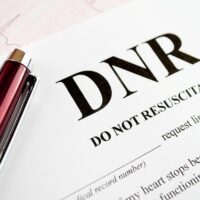Do I Need a DNR in My Estate Plan?

Forbes’s article entitled “Should “Do Not Resuscitate” Be Part Of Your Estate Plan?” explains the difference between a health care proxy and a DNR.
A health care proxy is a legal document that lets you name an agent to make health care decisions for you. It is used if you’re unable to make those decisions for yourself. When you were again able to communicate, you’d go back to making your decisions for yourself. The ability to create a health care proxy is governed by your state’s laws. Every state’s laws are different.
Ask an experienced estate planning attorney how to comply with your state’s law in creating these directives. He or she will know about health care institutions and whether they will give authority to the documents you created. If they won’t, your named agent would have to go to court to enforce them.
You can also supplement your state’s directives with additional guidance.
Some states’ directives require a set series of instructions for your agent. For instance, it may include questions as to whether you want life sustaining treatment and medically administered nutrition and hydration. Other states contain language that is broader. They allow the agent more latitude to decide end-of-life decisions. This language usually includes the intention that you want to be taken off life support, if you have a terminal illness or injury and your death is imminent.
A DNR is a medical order informing health care workers that they are not to revive you. It is a document that you put in place with your physician. Some states have also adopted MOLST forms (Medical Orders for Life Sustaining Treatment) to address other situations, like intubation, ventilation and dialysis. These documents require a thorough discussion between the patient and the health care provider. They are typically part of end of life care, when a person has an advanced stage terminal illness.
If you’re relatively healthy, you want to be treated – and resuscitated – if you have a heart attack. There may be a time when you need a DNR, but most likely it’s not now. If and when that time comes, you’ll need to have a talk with your doctor about a DNR.
However, you should speak with your estate planning attorney about your health care proxy, especially if you don’t have one. Whether it’s during the coronavirus pandemic or not, a health care proxy is a critical part of a complete estate plan.
Reference: Forbes (May 28, 2020) “Should “Do Not Resuscitate” Be Part Of Your Estate Plan?”
